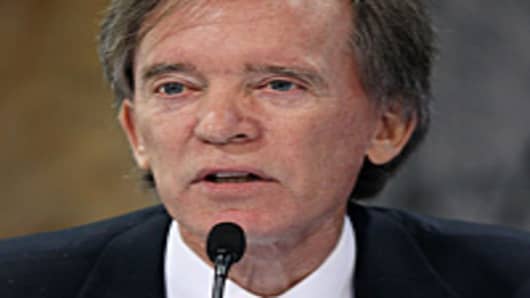The Federal Reserve's plan to pump more money into the financial system could mean the end of the bull market in bonds, Bill Gross, CEO of bond fund Pimco, said Wednesday.
“Check writing in the trillions is not a bondholder’s friend,” Gross wrote in his monthly outlook letter released on Wednesday. “It is in fact inflationary, and, if truth be told, somewhat of a Ponzi scheme. Public debt, actually, has always had a Ponzi-like characteristic.”
The Fed is likely to announce next week a new round of buying Treasury bonds—known as quantative easing—in an effort to jump-start the sluggish US economy.
The Fed has already bought roughly $1.7 trillion of government debt over the past year, but many economists believe it hasn't done much to boost economic growth or employment.
Speculation on the latest round of Fed bond buying has ranged from $500 billion to $2 trillion, though the Wall Street Journal reported Wednesday that the central bank may start buying only a few hundred billion dollars over several months.
Bonds have rallied for months as investors shunned stocks and sought a safe haven. But bond yields have been pushed to such historic lows that investors are starting to look elsewhere for better returns. Further bond buying by the Fed is likely to increase that trend.
“It will likely signify the end of a great 30-year bull market in bonds, and the necessity for bond managers and, yes, equity managers to adjust to a new environment,” he wrote.
Gross also said that injecting more liquidity into the markets may not help because consumer demand has not increased.
"We are, as even some Fed Governors now publically admit, in a “liquidity trap,” where interest rates or trillions in QE II (second round of quantitative easing) asset purchases may not stimulate borrowing or lending because consumer demand is just not there," Gross wrote. "Escaping from a liquidity trap may be impossible, much like light trapped in a black hole."
In comments to CNBC Wednesday, Gross said he was "suspicious" quantitative easing may not work, but that he still believed the Fed should give it a try.
"Ultimately, it stands a chance of raising real growth," he said, "in a real, structural way."


